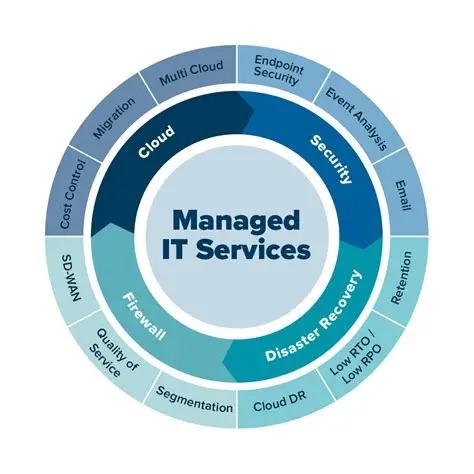Technology drives every modern business—from the way you communicate with clients to how you store and protect valuable data. But as your company grows, managing IT internally can become a heavy burden. What once took a few minutes to fix can now consume hours of productivity, and the consequences of even minor downtime can be costly.
This is where a Managed IT Service Provider comes in—an external team that proactively manages your networks, cybersecurity, hardware, and support systems. If you’re wondering whether your organization could benefit from one, here are five clear warning signs that it’s time to make the switch.
1. Frequent Downtime and Slow Systems
If your employees constantly experience computer crashes, slow applications, or unreliable Wi-Fi connections, your IT infrastructure is sending a clear distress signal. Downtime—whether caused by system errors, outdated hardware, or poor network maintenance—can bleed both productivity and revenue.
Managed IT providers take a proactive approach. Instead of reacting after something breaks, they monitor your systems 24/7, apply updates before issues escalate, and resolve problems remotely in real time. This ensures business continuity and prevents small glitches from snowballing into full-scale outages.
When uptime directly impacts customer satisfaction and profit, having professionals manage your infrastructure is no longer optional—it’s essential.
2. Rising Cybersecurity Threats and Data Concerns
Cyberattacks are increasing in both frequency and sophistication. Phishing emails, ransomware, and insider breaches target businesses of all sizes—not just large corporations. If your company doesn’t have multi-layered security measures, real-time monitoring, and employee training in place, you’re leaving the door open to disaster.
An MSP provides enterprise-level cybersecurity tools at a fraction of the in-house cost. They implement firewalls, antivirus systems, threat detection, encryption, and secure backups, ensuring your sensitive data stays protected. Moreover, many MSPs help businesses maintain compliance with data-protection regulations such as HIPAA, GDPR, or SOC 2—standards that can be complex to handle alone.
If your business lacks the time or expertise to keep up with evolving threats, partnering with a managed IT provider offers peace of mind and risk reduction.
3. Overwhelmed or Understaffed IT Team
Small and mid-sized businesses often rely on one or two IT staff members to “handle everything.” But as operations scale, so do technology demands—cloud integration, VoIP systems, remote access, cybersecurity, software updates, and more.
When your in-house team spends most of its time putting out fires, strategic initiatives like digital transformation, automation, or data analytics fall behind. That’s when burnout and turnover become serious risks.
Managed IT services extend your team’s capabilities without increasing your payroll. Whether supplementing internal staff or fully outsourcing IT, an MSP ensures continuous coverage, expert specialization, and predictable monthly costs. Your employees stay focused on business-critical goals instead of routine maintenance and troubleshooting.
4. Uncontrolled IT Costs and Unpredictable Spending
Unexpected IT failures can drain your budget fast—server repairs, data-recovery expenses, emergency consultants, and lost productivity all add up. If your IT spending fluctuates wildly from month to month, it’s a clear sign of reactive management.
Managed IT services operate on a flat-rate subscription model, offering transparent and predictable costs. Instead of paying for emergency fixes, you invest in preventive maintenance. MSPs also guide you on optimizing software licenses, cloud subscriptions, and hardware upgrades, helping you allocate funds strategically rather than reactively.
In short, outsourcing IT allows you to stabilize your technology budget while gaining access to advanced tools and expertise you couldn’t afford internally.
5. Limited Strategic IT Planning and Growth Alignment
Technology isn’t just a support function—it’s the foundation of growth. If your current IT setup doesn’t scale with your company, you risk stalling progress. Many small businesses operate without a roadmap for upgrades, cloud adoption, or data management, which leads to inefficiencies and missed opportunities.
Managed IT providers act as strategic partners, not just troubleshooters. They assess your infrastructure, forecast future needs, and align technology decisions with your long-term business goals. Whether you’re planning to expand locations, enable hybrid work, or migrate to the cloud, an MSP ensures your systems are ready to grow with you—securely and efficiently.
The Hidden Value: Proactive Monitoring and Peace of Mind
Beyond these five signs, one of the greatest advantages of partnering with a managed IT service provider is peace of mind. Instead of reacting to emergencies, your systems are continuously monitored, patched, and optimized in the background. This proactive approach minimizes disruptions, improves employee morale, and frees you to focus on innovation rather than maintenance.
Most MSPs also provide comprehensive reporting, giving you full visibility into system health, performance trends, and security events. These insights help leaders make informed technology decisions—something that’s difficult to achieve with an overworked internal team.
Choosing the Right Managed IT Partner
Not all MSPs are created equal. When evaluating providers, look for a partner that offers:
-
24/7 remote monitoring and help desk support
-
Proven expertise in cybersecurity and data protection
-
Scalable service plans tailored to your company size
-
Transparent pricing and clear service-level agreements (SLAs)
-
A track record of client satisfaction and measurable results
A good managed IT provider doesn’t just fix problems—they anticipate them, align technology with business strategy, and act as an extension of your organization.
Conclusion
If you recognize any of these five warning signs—frequent downtime, growing cybersecurity risks, an overwhelmed IT team, unpredictable costs, or lack of strategic direction—it’s time to consider managed IT services. In today’s fast-moving digital landscape, technology should empower your business, not hold it back.
By partnering with a trusted managed IT service provider, you gain stability, security, scalability, and strategic insight—all while keeping costs predictable. The result is simple: less stress, more efficiency, and a stronger foundation for growth.

